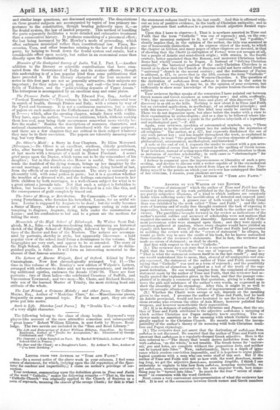LETTER PROM THE AUTHOR OF "Lan AND Fermi."
Sin—In a recent notice of the above -work in your columns, I find some errors of statement, for which, (relying upon the old reputation of the Spectator for candour and impartiality,) I claim an author's privilege of correction.
Your reviewer, commenting upon the definition given in Time and .Faith of the word "Catholic" makes the following remarks —" That is, the term Catholic Church' was originally applied to the Church of Smyrna as a term of reproach, meaning tho church a/ the garage Chats: ; for that is what the statement reduces itself to in the last result. And this is affirmed without an iota of positive evidence, in the teeth of Christian antiquity, and in utter ignorance that KKOOX4KOT is a genuine Greek adjective formed regularly,' Upon this I have to oliserve-1. That it is nowhere asserted in Time and Faith that the term " Cntholio " was one of reproach ; and, on the contrary, the meaning assigned to it, not of universal," but "godlike," clearly implies that, in the opinion of the author, the title was assumed as one of honourable distinction. 2. An express object of the work, to which the chapter on Gibbon and many pages of other chapters are devoted, is that of showing that the Ueda (a corruption of Perot) were not savages at all, but a people of Asiatic and semi-Greek origin ; with armies, in the fourth century, better appointed than the Roman, and moreover Christians before Rome had wholly ceased to be Pagan. 3. Instead of "defying Christian antiquity," the historical position of the early Christian Ohurchee is so traced as to show that the Church at Smyrna could not have milled itself an "universal" church in the second century • and the testimony of Pacian is adduced, p. 471, to prove that in the fifth century the term 'Catholic" was at least notso understood by the Westeni Churches. 4, The question of the derivation of Katlokixot uatIoXoo is discussed in the notes to pp. 41,5 and 471; wrongly, it may be, in the opinion of your reviewer, but sufficiently to show some knowledge of the popular lexicon theories on the subject. lour reviewer further speaks of the connexion I have pointed out between Greek names and Greek numbers as something now; and adds, scoffingly, "We hope our readers see the full force and glory of this discovery." The discovery is as old as the hills, Nothing is new about it in Time and Faith but an extended application,, in mythology, of an admitted principle ; and with this reserve—" Analogies of this kind may easily be carried too far. These we do not dogmatize upon, but place before the reader with a view to their examination by archicologista ; and as a clue to be followed whore historians lISN's left us without a guide in the pathless labyrinth of a legendary and mythological past."—P. 412. Again, your reviewer, speaking of astronomical symbols, says, "These would appear to be the author's patent key for unlocking the mysteries of all religions." The author, at p. 377, has expressly disclaimed the use of any such patent key ; and has sought throughout the work, as explained in the preface, to trace "the gradual blending of various elements of opinion— philosophical, astronomical, mythological, and historical."
A note at the end of vol. I. requests the reader to correct with span several typographical errors that have occurred in the spelling of Greek terms. Your reviewer, instead of acting upon this suggestion, calls attention to them as instances of careless scholarship ; in such cases as "chresmologia" for " chriismologoi" " gym)," for "Byre" dm.
I forbear to oomment upon the ingenuousness or liberality of such a proceeding, and decline to discuss with II writer capable of it the etymological questions of whether Siifioe was derived from Smia or eton from ave. Con fining myself to the points on which your reviewer has outsteppod the limits of fair criticism, I remain, your obedient servant, Tux AUTHOR OF "TIME AND FAITH."


























 Previous page
Previous page